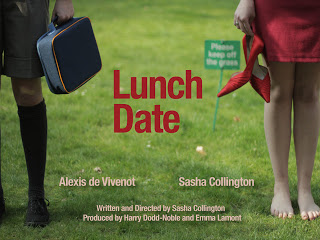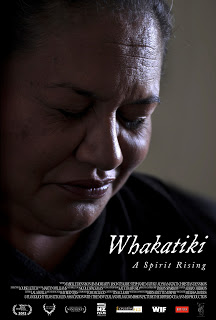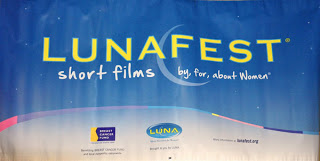 |
| The 12th Annual Lunafest |
Written by Janyce Denise Glasper
From five to eighteen minutes long, these nine diversified, honest, and beguiling films weaved an intriguing approach to storytelling of a thoughtful intelligent female spirit severely lacking in Hollywood , an industry still heavily promoting typical weak, overtly sexualized, “stay young forever” ideology.
My top three favorites were Angela Dorfman’s vibrantly engaging animation Flawed, Rebecca Dreyfus’s Self Portrait with Cows Coming Home and Other Works, a documentary film on Hungarian photographer, Sylvia Plachy, and Sasha Collington’s hilariously entertaining Lunch Date.
 |
| In Georgena Terry, the owner of Terry’s Bikes discusses how she reinvented the bicycle to support a woman’s unique shape and the injustice of men trying to sabotage her genius. |
Lunafest opens with Georgena Terry, Amanda Zackem’s documentary film on a creator of her own self-titled line of women’s cycling bikes. Through vigorous research straight from an engineering hypothesis–countless hours of measurements, analysis, and discoveries–Terry learned that women were shaped differently from men and that bicycles should reflect those facts. Of course she gave her findings to a man and he laughed right in her face. Firing up her desires further, she worked even harder, deconstructing traditional man’s shape into a woman’s frame of mind, and started up a successful business that proves the notion that anything is possible with fearless determination. It wasn’t an easy journey, but she fought the good fight and won.
Now this was just the beginning of an enthralling, inspirational film fest.
 |
| Angela Dorfman shines as she draws out her frustrating insecurities in Flawed. |
Flawed starts off on a brown wooden table where rests water, a set of watercolors, and blank paper. As each beautiful, colorful, splotchy watercolor drawing gets illustrated by swift moving paintbrush and table gets noticeably stained further, narrating Dorfman balances between lighthearted humor and serious tones about a young girl whose long-distance relationship with a plastic surgeon sets her on the path to questioning identity. She depicts a saddened reality of not fully loving her unique features and of easily accessible body reconstruction. Dorfman speaks of a world where people want to change their appearances or someone else’s to feel “normal” when in fact each trait of difference gives us our identifiable edge and distinct character.
Dorfman completely controls composition of her quirky, wonderful one-woman show–writing, drawing, directing, and producing an entire effort that all ages must see and hear!
 |
| Sylvia Plachy proudly still uses the same black box camera her father gave her, in the beautiful documentary Self Portrait with Cows Coming Home and Other Works. |
Dreyfus takes a rare look into the black and white world of Sylvia Plachy in aptly titled, Self Portrait with Cows Coming Home and Other Works. Silver haired with a thick accent, Plachy is an eclectic artist who speaks of her roots and interest in photography. Warm, humorous, and vivacious, she speaks of process, showcases favorite compositions, and allows viewers to see her in action, going on to photograph Albert Malyas. Dreyfus focuses on the beauty of not just Plachy’s powerfully compelling works that span four decades, but on an alluring shyness that defines brimming intellectual sensibility. Plachy lets the art speak for her. That voice though soft and wispy, can be heard in each photograph- loud and clear.
 |
| Sasha Collington wrote, directed, and co-starred in Lunch Date, which is in the works of being her first full-length film. |
In Collingwood’s Lunch Date, a woman is dumped by her boyfriend’s younger brother in a rather hilarious spin on the classic break up. Of course, Annabel, the dumpee, is devastated and confused, categorizing her “faults,” wondering why any man would treat her so callously, not even once considering that he is obviously an immature, mean-spirited coward for using his brother as an outlet to part ways. Wilbur, the break up brother invites Annabel to share his awkward schoolboy lunch outdoors. They exchange stories and funny quips, building a minute relationship that is refreshingly innovative.
One cannot help but become intrigued by Collington’s plans for full length version.
 |
| Jisoo Kim’s magical animation about where women retreat to for serene relaxation. |
Jisoo Kim, an artist working for Disney Interactive, crafted another animated picture, The Bathhouse, which is a spiritually gratifying feature of flowing tranquil womanly forms of all shapes, colors, and sizes. Too sensual for a spot in Fantasia, Kim’s piece starts off with busy, hardworking females in professional attire. Yet at the Bathhouse where magical water overflows, they freely strip of their clothes and bare their souls, swimming in serene waves like mystical mermaids. There are no classes, no stereotypes, no boundaries, as these women frolic with eyes peacefully closed and move to melodious, haunting music, enjoying time away from every day chaos.
 |
| It’s more than gymnastics as a girl privately battles puberty in Chalk. |
Martina Amati takes a poignant look inside coming of age in Chalk. Avidly focusing on moments of breaking up with childhood, diving quietly into maturity at a gymnast training camp, a girl dolls up in makeup with her roommate. However, amongst back flips, cartwheels, sultry movements, and routine hands tousled in white dusty powder, she valiantly braves through her adolescence alone, always clutching at abdomen confused by the new found pain. Yet in a competitive world of coaches and balance beams, temporarily lost with no mother figure to discuss changing body and secrets thoughts of boys, she finds her way and accepts it without complaint.
 |
| In Blank Canvas, an artist fills a unique surface with an intricately designed composition. |
Blank Canvas opens up to the reality of a cancer survivor, Kim.
Speaking rather frankly about hair obsession, how it defines beauty in American culture, she is opposed to boarding the wig route as most women feel inclined to do. Kim isn’t ashamed of her baldness, stating that she had a great hair life, and feels that the time is to now cherish her badge of courage. Cancer is not a shame, but a diagnosed circumstance that she lives with every single day. In Sarah Berkovich’s bittersweet and uplifting documentary, her camera follows Kim into a henna studio where an artist uses her head as surface to create and the end result is a breathtaking masterpiece of visually stunning expression.
 |
| A woman becomes one with water in Whakatiki: A Spirit Rising |
In a connective merging of past and present, Louise Leitch’s Whakatiki: A Spirit Rising, little Kiri enjoys swimming freely in the river, but as an older woman, she appears to have lost that fiery freedom that being underwater gives her. Recluse, reluctant, and tired in obese appearance, she goes along with her family towards the riverbanks, sitting on the sidelines admiring fit Josie laid out in her bikini. Kiri’s angry husband’s tirade unleashes Kiri’s locked soul and immediately she runs straight into cascading waters, fully clothed in her plight to escape into the one thing that has always made sense.
 |
| In When I Grow Up, sometimes a role model is the one person a child neglects to see. |
In Sharon Arteaga’s sentimentally touching When I Grow Up, Michaela is working hard on her school poster, non verbally communicating desires of her role model, the first Latina Supreme Court Justice, Sonia Sotomayer in the back of a van as Letty, her mother sells homemade tacos out of the van. An argument ensues when Michaela angrily berates Letty, hating that the taco business makes her late for school. It is in that final scene of mother changing into work uniform and daughter pausing at school entrance, in which daughter and mother stare into each other’s eyes and share not just a smile but a moment of oneness.
Now that’s another part she would be proud to play.
 |
| One of twenty women screaming for justice in Megan Hague and Kyle Wilkinson’s Women Who Yell. |
After the nine films ended, the crowd was treated to free miniature Lunabars and a local film by Wright State University students, Megan Hague and Kyle Wilkinson, entitled Women Who Yell. Inside a dark room focusing on female population of all ethnicities speaking alone in front of cameras breaking fourth wall barrier, these college students start off loudly screaming, passionately hollering out what bugs them, poignantly shedding hurts and sorrows, and bluntly voicing their attitudes about men’s perception. The issues addressed like sexual orientation, harassment, how women should support one another are topics still imperative today.
 |
| Jisoo Kim, artist and creator behind The Bathhouse. |
In conclusion, Lunafest gave hope that there are women trying to change the film industry, who won’t be kept out in the dark much longer. They’re not bursting out of corsets, wearing tons of makeup, or waiting for a male hero. These filmmakers integrated organic naturalistic quality that adds genuine honesty to these amazingly told short stories.
Men may not always support it, but women do appreciate portrayals of integrity and the brazen female spirit.
